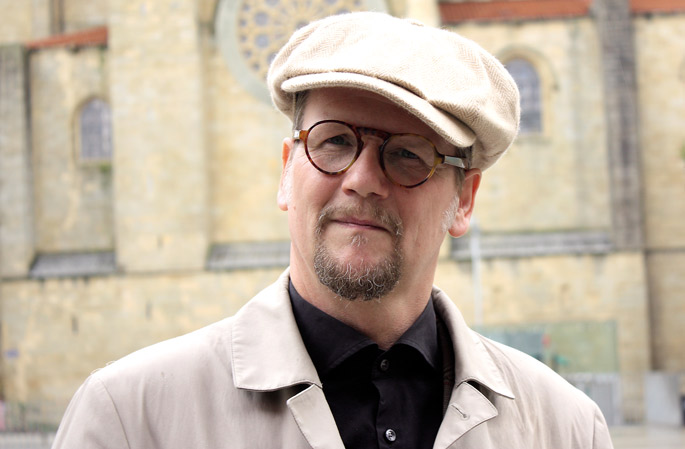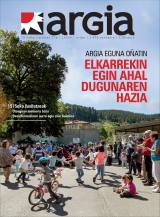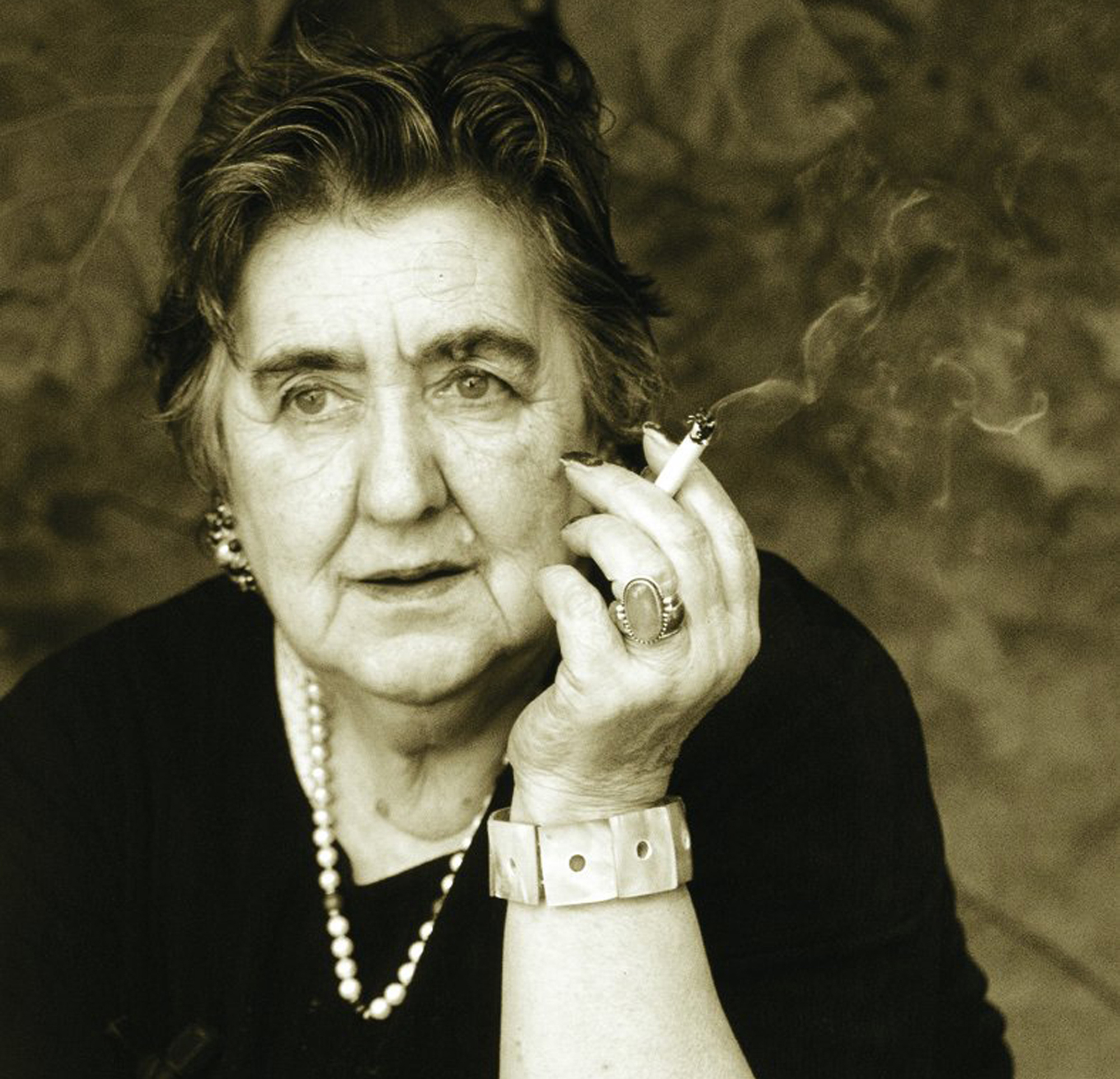"Popular literature stories are more complicated than they seem"
- A friendly interlocutor is Sigurjón Birgir Sigurdsson, an Icelandic writer best known as Sjón. We talked to him in Donostia, before offering a conference at the San Telmo Museum, on the occasion of the novel Argoren Ezpala, which the publisher Pasazaite has just published in Euskera. The editor of the editorial Xabi Queiruga and the translator of the book Juan Mari Mendizabal have also accompanied us in the interview.

Your books have been translated into many languages. For a writer who uses Icelandic, is it special to see his work in Basque?
It's always an adventure to translate any of your books into another language. But, of course, it gives special pleasure when it comes to a language in which few speak like the Icelandic language. In Iceland we never talk about “big languages” and “small languages”, but about those that are spoken by few or many. A language is never small. For example, if we can translate Shakespeare into Icelandic, the Icelandic is big enough to include Shakespeare; if you can translate Dante into Euskera, if the Basque is big enough to include the Italian. The great languages are translated from anywhere; those of the languages in which we speak less people, sharing books is a special challenge.
Reading about your trajectory, it is always mentioned that your beginnings have been linked to the avant-garde. This Argo splinter seems distant from these possibilities, as it focuses on the re-reading of the Greek classics. Would you explain to us what intermediate development has been?
In the late 1970s, I started writing poetry and participated in the Surrealist Medusa group. We broke with tradition, we looked for new ways to use Icelandic, we looked for new opportunities for our poetry. But make the name of the account group: The jellyfish, of course, is taken from Greek mythology. It's Pegasus's mother, who was released when her head was cut off from Medusa. So from the very beginning I realized the possibilities of the Greek myths. In addition, Surrealism maintained from the beginning a kind of dialogue with Greek mythology – one of the most important journals of the surreal movement was Minotaure.
It is true, however, that the relationship between the two trends is not so obvious. Maybe in this novel it's easy for me to put together an old boring man who has no more than fish in his head, Valdimar Haraldsson, and a pilot who's almost 5,000 years old. I put them together, and they start squabbling with the storytellers. That seems to me to come from surrealism.
How can one describe the experience of the protagonist Valdimar Haraldsson in this novel? Would you consider the journey as initiatic?
Valdimar is completely obsessed with his racial theories that are based on fish consumption. It's absolutely stuck in that world. He's an old man, and all he needs is for him to hear. Of course, everyone who knows it has long given up listening, so when it comes to a boat trip, he understands it as an opportunity to talk about fish continuously. Then you'll find out what most people find when they go to the sea: sailors don't want to eat fish, they want meat, after all, fish is not food for them, it's work. His obsession with this fact makes Valdimar not think twice that this man who sits for dinner with him is 5,000 years old and that Jason participated in his journey with Argonaute.
Given the time in which history is situated, can we consider Argo's spade as a post-war novel?
Yes, in fact, ideas like those of Valdimir provoked one of the greatest tragedies of the 20th century: The Holocaust and all racial tendencies in Nazi Germany. And yet, he talks about those ideas as if nothing had happened. I don't know if I count on the epilogue of the book: this character is based on my great-grandfather [doesn't say Xabi Queiruga editor]. He himself wrote in an Icelandic newspaper an extensive article in two parts, entitled Fish and Culture. Many of those ideas I took from him: he wrote a log book on one of his travels, as I almost told in the novel, but in the Mediterranean. The first time I read it I couldn't believe how easy it was for him to say it even after my experience in war.
“The stories in popular literature talk about the essential parts of our societies,” he said four years ago in the Guardian newspaper. Doubts: Is it not common for popular literature to oversimplify the inherent complexity of human experience?
I don't know, I think popular literature was the only way people had to talk about difficult and complicated things. I consider it a very important way to talk about life: complicated sex, violence, mistreatment suffered by people… Popular literature stories are more complicated than they seem. The only problem I see to you is how many times they are used for nationalist purposes. Because whenever they're used for that purpose, of course, stories are used in a very simplified way, they make the world smaller.
You've come to San Sebastian to talk about the possibilities that non-hegemonic languages have in film. Looking at the projection of Icelandic culture in the world, do you have any advice for the Basques?
In Icelandic culture, the most exemplary thing is, in my view, the fact that it has joined the language. We write in our language and we are in our language telling stories in film and literature. We believe in storytelling, in the need for human beings to share stories. We have always been willing to listen to distant stories, that has allowed our society to grow, because we have learned things, because we have taken things from here and there… We have had the doors open to communicate and at the same time that stories have come to our small island, we have felt very confident about ourselves when we have taken our stories out. So the lesson is that your stories are interesting, and even more so if you count them in your language.
Ekain honetan hamar urte bete ditu Pasazaite argitaletxeak. Nazioarteko literatura euskarara ekartzen espezializatu den proiektuak urteurren hori baliatu du ateak itxiko dituela iragartzeko.
Aste honetan aurkeztu da Joseph Brodskyk idatzitako Ur marka. Veneziari buruzko saiakera. Rikardo Arregi Diaz de Herediak itzuli eta Katakrak argitaletxeak publikatu du poeta errusiar atzerriratuari euskarara itzuli zaion lehen liburua.
"There were women, there they were, I met them, but their families locked them in the mental hospital, put them in electroshock. In the 1950s, if you were a man, you could be a rebel, but if you were a woman, your family would lock you in. There were some cases, and I met them... [+]
Gauza garrantzitsua gertatu da astelehen honetan literatura euskaraz irakurtzea atsegin dutenentzat: W. G. Sebalden Austerlitz argitaratu du Igela argitaletxeak. Idoia Santamariak egindako itzulpenari esker, idazle alemaniarraren obrarik ezagunena nobedadeen artean aurkituko du... [+]
Asteazken honetan aurkeztuko dituzte Erein eta Igela argitaletxeek Literatura Unibertsala bildumako hiru lan berriak, tartean Maryse Condéren Bihotza negar eta irri (ene haurtzaroko istorio egiazkoak). Joxe Mari Berasategik euskaratua, idazle guadalupearraren obra... [+]
Wu Ming literatur kolektiboaren Proletkult (2018) “objektu narratibo” berriak sozialismoa eta zientzia fikzioa lotzen ditu, Sobiet Batasuneko zientzia fikzio klasikoaren aitzindari izan zen Izar gorria (1908) nobela eta haren egile Aleksandr Bogdanov boltxebikearen... [+]























